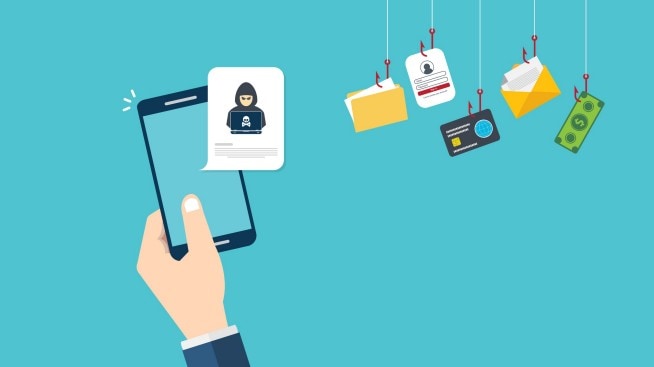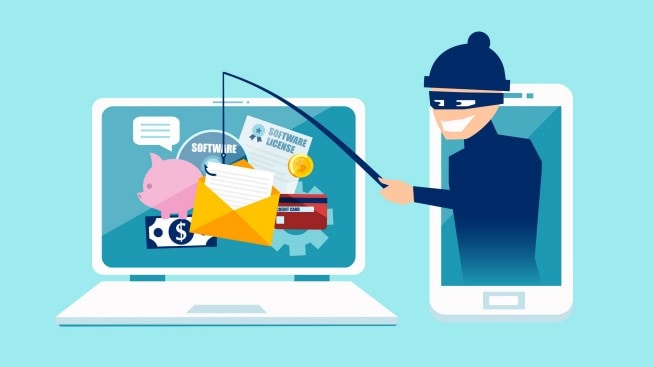What is the dark web and what does it mean for your identity?

Quick insights
- Despite most of the world’s population using the worldwide internet, many have barely scratched the surface of it or even heard of the many pages existing on what’s known as the dark web.
- The dark web represents the hidden parts you need a special browser to see. This makes the pages of the dark web a bit like an online black market — they provide a level of anonymity and privacy for users and their activity.
- There are ways to keep track of what might be happening to your credit score and other personal information.
When it comes to your identity on the internet, is your information even more at risk on the dark web? Let's learn more.
The three parts of the web
The worldwide web is made of three parts: Surface web (what shows up in your search engine), the deep web (the pages that can't be found by a search engine) and the dark web. Before diving into the dark web, it's helpful to understand all three levels. The worldwide web is made up of millions of pages, only a small portion of which you see when you type a question into a search engine. Here's how the three levels of the web are different from one another.
What is the surface web?
The surface web refers to the internet where public websites reside. Search engines can see these sites and serve them as search results to the public. This is where most of us spend time on the internet when we read a local news story, read a restaurant's menu, or watch an influencers public social media video.
What is the deep web?
Although the majority of people use the surface web, the deep web is by far the largest part of the internet. Estimates put the size of the deep web at about 95% of the overall worldwide webrelevance-darkweb. That’s because the deep web tier consists of password or paywall-protected pages and sites that search engines can’t see and display to the public. It contains millions of pages with sensitive and private information. These may include medical documents, government intel and legal reports. In a nutshell, the deep web is a high-security world, almost like a vault filled with precious data.
Many surface websites have deep web assets, such as a health care company’s patient portal or direct messages on a social media platform. These parts of the websites are not part of the surface web even though the public facing pages may be seen there.
What is the dark web?
This tier of the web dwells in the internet's shadows with no formal regulation or organization... It’s the Wild West of the internet.
Traditional search engines can’t pinpoint dark web sites in their search results. You also need a special browser to use the dark web. That means you must make a concerted effort to enter the dark web and are unlikely to end up there accidentally. Dark websites also require greater planning and effort to find because the pages have different types of URLs. While many surface and deep web URLs end in ".com" or ".org," dark web pages are made up of a complex and seemingly random set of letters and numbers. These URLs may even change often.
Is the dark web dangerous?
The short answer is yes, the dark web can be dangerous. That’s because there aren’t standards, regulations or arbiters to hold users accountable on the dark web. It’s a world without rules, which can be risky. But there’s also the marketplace of the dark web to consider. People use the dark web for a variety of reasons.
There are legitimate reasons to venture onto the dark web, from journalists with groundbreaking stories to whistleblowers ready to expose structural or corporate injustice. The dark web can give a voice to those who may have more information than power to share what they know. That’s a benefit as well as a danger of the dark web. People who desire privacy or protection can express themselves without as much consequence as they may face on the surface web, where most identifying details can be captured and recorded. That’s why the dark web’s shield of anonymity represents the double-edged sword of the internet. Dark web features that can empower the powerless may also amplify destructive voices.
Conversely, your identity can also be exploited more easily on the dark web than other areas of the internet. That’s because in the Wild West of the worldwide web, there are perpetrators lying in wait to target the vulnerable without recourse. The surface and deep web may come with security features that protect your personally identifying information, whereas the dark web doesn't have this. So, if you use the dark web, it may be easier for your personal information to fall into the hands of a ne'er-do-well. Even if you didn't visit the dark web, if a thief obtained your information elsewhere, it may be easier for them to use your information on the dark web without you knowing. Thankfully, there are steps you can take to protect yourself from identity theft.
How can I protect my information on the dark web?
Helpful tools can make it easier to protect your personal information, such as a virtual private network (VPN) and dark web identity monitoring.
A VPN is a service that secures your connection to the internet and acts as a shield for your identifying data to protect your information while you use the Internet. Meanwhile, services like Chase Credit Journey® can help protect you online and offline with dark web surveillance, data breach monitoring, SSN activity tracking and identity verification alerts. Best of all, you can enroll in Chase Credit Journey® for free. So, whether you visit the dark web or someone else sells your identifying information to the highest dark web bidder, this service can help protect your identity.
The bottom line
The dark web may present as many dangers as it does opportunities, but you don’t have to fear this shadowy realm. Identity protection and monitoring can help you keep your personal identifying information safe with services like Chase Credit Journey®. Staying aware and protected can help you stay positive as you surf the world wide web.



